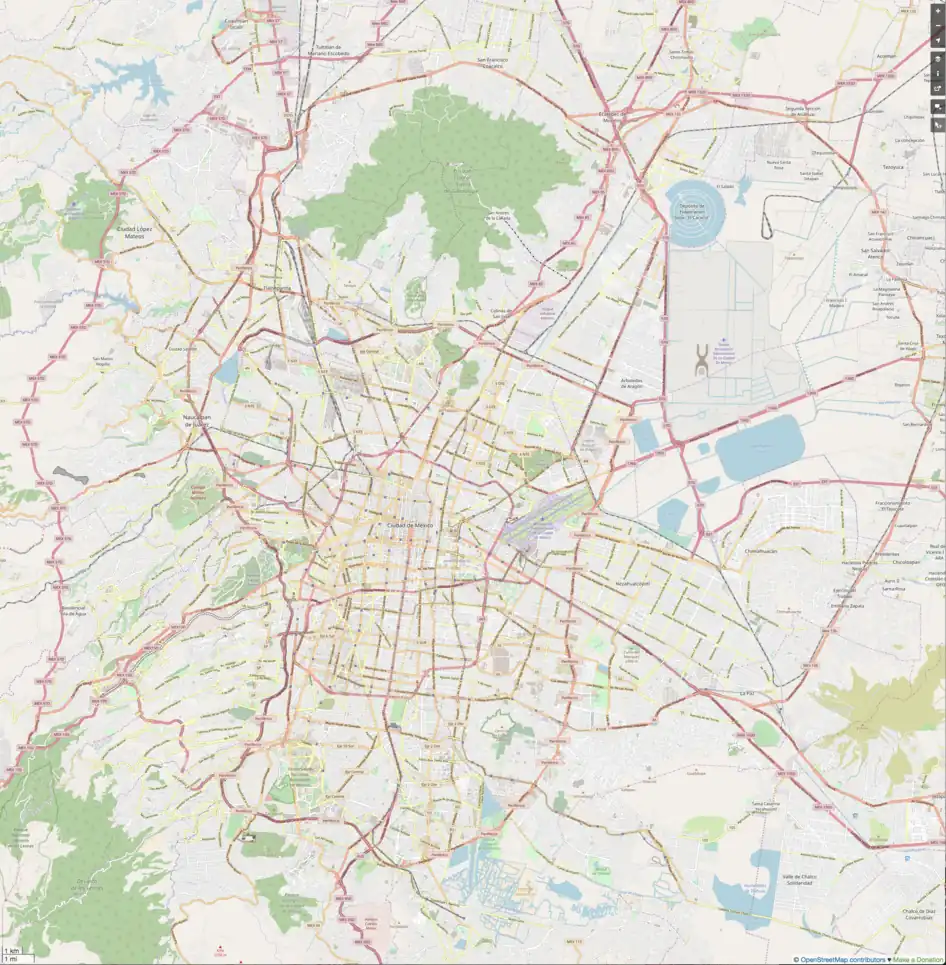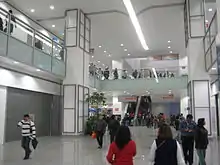| STC rapid transit | |||||||||||
 The station as seen from the adjacent Mexipuerto shopping mall. A Mexibús is seen below (2012). | |||||||||||
| General information | |||||||||||
| Location | Carlos Hank González Avenue Ecatepec de Morelos, State of Mexico Mexico | ||||||||||
| Coordinates | 19°32′05″N 99°01′39″W / 19.534595°N 99.0275°W | ||||||||||
| Owned by | Government of Mexico City | ||||||||||
| Operated by | Sistema de Transporte Colectivo (STC) | ||||||||||
| Line(s) | |||||||||||
| Platforms | 2 island platforms | ||||||||||
| Tracks | 3 | ||||||||||
| Connections | |||||||||||
| Construction | |||||||||||
| Structure type | At grade | ||||||||||
| Accessible | Yes | ||||||||||
| Other information | |||||||||||
| Status | In service | ||||||||||
| History | |||||||||||
| Opened | 30 November 2000 | ||||||||||
| Passengers | |||||||||||
| 2022 | 14,166,172[1] | ||||||||||
| Rank | 11/195[1] | ||||||||||
| Services | |||||||||||
| |||||||||||
| Location | |||||||||||
 Location within Greater Mexico City | |||||||||||
| Area map | |||||||||||
Ciudad Azteca metro station[lower-alpha 1] is a station of the Mexico City Metro along Carlos Hank González Avenue (otherwise known as Central Avenue), in Ecatepec de Morelos, State of Mexico, in the metropolitan area of Mexico City. It is an at-grade station with two island platforms that serves as the northern terminus of Line B (the Green-and-Gray Line). It is followed by Plaza Aragón metro station. It serves the colonia (neighborhood) of Ciudad Azteca (es), from which the station takes its name. It is also adjacent to the north end of Mexico's busiest mall (as of 2018), Multiplaza Aragón. The station's pictogram features the silhouette of the neighborhood's glyph.
Ciudad Azteca metro station opened on 30 November 2000 with service southwestward toward Buenavista metro station. In 2019, Ciudad Azteca metro station had an average daily ridership of 58,658 passengers, making it the 12th busiest station in the network and the second-most used on the line. The facilities are accessible to people with disabilities as there are elevators, tactile pavings and braille signage plates. The station is served by the Terminal Multimodal Azteca Bicentenario (also known as Mexipuerto Ciudad Azteca), a shopping mall and transport hub that connects with local routes and the Mexibús Line I, a bus rapid transit line that connects Mexico City to the Felipe Ángeles International Airport.
Location and layout

Ciudad Azteca is a metro station located along Carlos Hank González Avenue (also known as Central Avenue), in Ecatepec de Morelos, State of Mexico, a neighboring municipality of Mexico City.[2] The station serves the colonia (Mexican Spanish for "neighborhood") of Ciudad Azteca (es). Within the system, Plaza Aragón is the next station.[2]
There are four exits (to the north, northeast, south and southeast of the station) all serving Carlos Hank González Avenue and De los Guerreros Boulevard.[2] The exits connect to the Terminal Multimodal Azteca Bicentenario (also known as Mexipuerto Ciudad Azteca),[3] a five-story shopping mall and transport hub (locally known as an Estación de transferencia modal [ETRAM]) that connects the area with local routes (known as peseros)[4] and the Mexibús Line I, a bus rapid transit line that connects Mexico City to the Felipe Ángeles International Airport, in Zumpango, State of Mexico.[5] Opened in 2009, and as of 2015, the hub had no crime reports and had 30 transportation routes operating with an average ridership of 180,000 daily users.[6] Ciudad Azteca metro station is adjacent to the north end of Multiplaza Aragón, the country's busiest mall in 2018.[7]
Ciudad Azteca station has a disabled-accessible service with elevators, tactile pavings and braille signage plates.[2]
History and construction
Line B of the Mexico City Metro was built by Empresas ICA;[8] Ciudad Azteca metro station opened on 30 November 2000, on the first day of the Ciudad Azteca–Buenavista service.[9] The station was built at-grade level.[10] The Ciudad Azteca–Plaza Aragón section is 574 m (1,883 ft) long.[11] The station's pictogram features the silhouette of the neighborhood's glyph, which depicts a typical Aztec building.[2] The line's workshop and the respective railyard are located after the station.[12]
Ridership
According to the data provided by the authorities since the 2000s, and before the impact of the COVID-19 pandemic on public transport, commuters averaged per year between 57,100 and 65,800 daily entrances between 2013 and 2019; the station ridership was 21,410,326 passengers in 2019,[13] which was an increase of 66,504 passengers compared to 2018.[14] Also in 2019, Ciudad Azteca metro station was the 12th busiest station of the system's 195 stations, and it was the line's second-most used, after Buenavista.[13]
| Annual passenger ridership | |||||
|---|---|---|---|---|---|
| Year | Ridership | Average daily | Rank | % change | Ref. |
| 2022 | 14,166,172 | 38,811 | 11/195 | +29.34% | [1] |
| 2021 | 10,952,831 | 30,007 | 12/195 | −10.98% | [15] |
| 2020 | 12,303,341 | 33,615 | 11/195 | −42.54% | [16] |
| 2019 | 21,410,326 | 58,658 | 12/195 | +0.31% | [13] |
| 2018 | 21,343,822 | 58,476 | 12/195 | +2.31% | [14] |
| 2017 | 20,861,402 | 57,154 | 12/195 | −7.59% | [17] |
| 2016 | 22,574,939 | 61,680 | 11/195 | −2.98% | [18] |
| 2015 | 23,268,879 | 63,750 | 11/195 | +2.53% | [19] |
| 2014 | 22,693,910 | 62,175 | 11/195 | −5.44% | [20] |
| 2013 | 23,999,979 | 65,753 | 11/195 | +1.49% | [21] |
Notes
- ↑ Estación del Metro Ciudad Azteca. Mexican Spanish pronunciation: [sjuˈðað asˈteka] ⓘ. The name of the station literally means "Aztec City" in Spanish.
References
- 1 2 3 "Afluencia de estación por línea 2022" [Station traffic per line 2022] (in Spanish). Sistema Transporte Colectivo Metro. 2023. Archived from the original on 5 March 2023. Retrieved 5 March 2023.
- 1 2 3 4 5 "Ciudad Azteca" (in Spanish). Sistema de Transporte Colectivo Metro. Archived from the original on 16 January 2022. Retrieved 11 February 2022.
- ↑ "Estación de transferencia Multimodal Azteca / Manuel Cervantes Estudio" [Multimodal Azteca hub/ Manuel Cervantes Estudio]. ArchDaily (in Spanish). 12 January 2010. Archived from the original on 13 February 2022. Retrieved 13 February 2022.
- ↑ "Ciudad Azteca". Sistema de Transporte Masivo y Teleférico (in Spanish). Government of the State of Mexico. Archived from the original on 13 February 2022. Retrieved 11 February 2022.
- ↑ Cruz Serrano, Noé (13 August 2019). "Mexibús Unirá al AICM con Santa Lucía" [Mexúbús will connect the Mexico City Airport to Santa Lucía]. El Universal (in Spanish). Archived from the original on 13 February 2022. Retrieved 15 February 2022.
- ↑ Ballesteros Mancilla, Laura Iraís; Dworak Camargo, Fernando (2015). Caminando hacia el futuro. Experiencia de movilidad en la Ciudad de México (in Spanish). Mexico City: Proyecto M2050. ISBN 978-607-96914-1-7. Archived from the original on 13 February 2022. Retrieved 15 February 2022.
- ↑ Ventura, Pamela (31 January 2019). "Los 5 malls más visitados en CDMX en 2018" [The 5 most visited malls in Mexico City in 2018]. El Financiero (in Spanish). Retrieved 20 July 2022.
- ↑ "Línea B, Ciudad de México" [Line B, Mexico City] (in Spanish). iNGENET Infraestructura. 20 July 2009. Archived from the original on 21 May 2021. Retrieved 21 May 2021.
- ↑ Grajeada, Ella (27 November 2000). "Abrirán en tres días la línea 'B'". El Universal (in Spanish). Archived from the original on 21 May 2021. Retrieved 21 May 2021.
- ↑ "Ciudad Azteca Metro Station (Mexico City, 2000)". Structurae.net. Archived from the original on 13 February 2022. Retrieved 13 February 2022.
- ↑ "Longitud de estación a estación por línea" [Station-to-station length per line] (in Spanish). Sistema de Transporte Colectivo Metro. Archived from the original on 4 May 2021. Retrieved 12 July 2021.
- ↑ Arana, Laura (2 June 2022). "Rescatan a Teco, perrito localizado en talleres del Metro en Ciudad Azteca" [Teco, a dog found in Metro workshops in Ciudad Azteca, is rescued]. El Universal. Mexico City. Retrieved 30 December 2022.
- 1 2 3 "Afluencia de estación por línea 2019" [Station traffic per line 2019] (in Spanish). Sistema Transporte Colectivo Metro. 2020. Archived from the original on 8 April 2020. Retrieved 3 May 2020.
- 1 2 "Afluencia de estación por línea 2018" [Station traffic per line 2018] (in Spanish). Sistema Transporte Colectivo Metro. 2019. Archived from the original on 6 June 2019. Retrieved 7 April 2020.
- ↑ "Afluencia de estación por línea 2021" [Station traffic per line 2021] (in Spanish). Sistema Transporte Colectivo Metro. 2022. Archived from the original on 7 March 2022. Retrieved 7 March 2022.
- ↑ "Afluencia de estación por línea 2020" [Station traffic per line 2020] (in Spanish). Sistema Transporte Colectivo Metro. 2021. Archived from the original on 21 June 2021. Retrieved 21 June 2021.
- ↑ "Afluencia de estación por línea 2017" [Station traffic per line 2017] (in Spanish). Sistema Transporte Colectivo Metro. 2019. Archived from the original on 3 May 2020. Retrieved 3 May 2020.
- ↑ "Afluencia de estación por línea 2016" [Station traffic per line 2016] (in Spanish). Sistema Transporte Colectivo Metro. 2017. Archived from the original on 3 May 2020. Retrieved 3 May 2020.
- ↑ "Afluencia de estación por línea 2015" [Station traffic per line 2015] (in Spanish). Sistema Transporte Colectivo Metro. 2016. Archived from the original on 3 May 2020. Retrieved 6 May 2020.
- ↑ "Afluencia de estación por línea 2014" [Station traffic per line 2014] (in Spanish). Sistema Transporte Colectivo Metro. 2015. Archived from the original on 3 May 2020. Retrieved 6 May 2020.
- ↑ "Afluencia de estación por línea 2013" [Station traffic per line 2013] (in Spanish). Sistema Transporte Colectivo Metro. 2014. Archived from the original on 3 May 2020. Retrieved 6 May 2020.
External links
 Media related to Ciudad Azteca (station) at Wikimedia Commons
Media related to Ciudad Azteca (station) at Wikimedia Commons